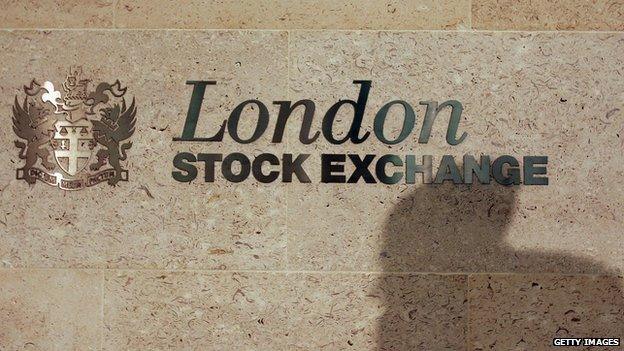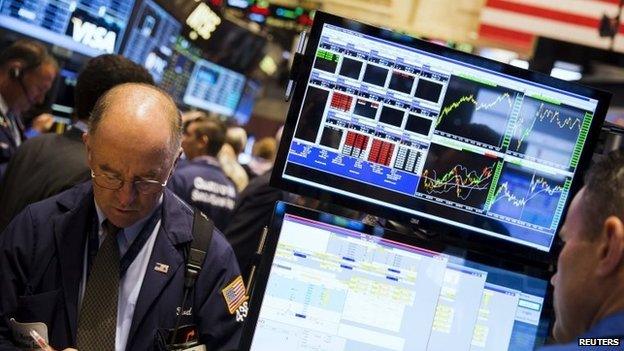Shareholders or fair shares
- Published

This will be a busy week if you're in the shareholding business - not only if you're caught in the Shanghai rout, but also if you watch some of the big players in corporate Scotland.
Whisky giant Diageo is on the regulatory rocks with an inquiry into its market information, being carried out by the Securities and Exchange Commission, while key growth markets have stopped growing.
Weir Group has suffered a hit from the sharp decline in its US market for fracking equipment. Both companies issue results on Thursday.
Shell and BP will update us on the impact of the oil price fall, while Royal Bank of Scotland has six-month figures that can be expected to continue its horror saga of slashing its balance sheet and compensating for mis-selling.
Last week, it was AG Barr, the brewer of Irn Bru, that was reporting the impact from price competition and the lack of thirsty weather.
Aberdeen Asset Management had to admit that the outflow of investors funds, and disappointing performances in key investment markets, had lost it £23 billion in funds under management in only three months.
And in Perth, SSE took a big hit after reporting the loss of 90,000 customers in only three months.
Quarterly capitalism
Having to admit all this is the price to be paid for being on the stock market, and publicly answerable to shareholders.
It used to be that you had to report every three months. That's become voluntary, but few have given up on it. Shareholders are impatient for data, and for some, even three months seems an eternity.
The short-termism of the stock market, and its impact on the operation of Britain's big corporates, is not a new source of concern.
But the mis-match between shareholders' interests and those of the economy in the longer term is becoming more of a source of worry, and not only on this side of the Atlantic.
Hillary Clinton last week staked out a key part of her economic programme to get her to the White House, by challenging "quarterly capitalism". It's not a lefty liberal viewpoint. It's already been raised by some of the biggest figures on Wall Street.
"How do we define shareholder value in the 21st century?" Clinton asked. "Is it maximizing immediate returns or delivering long-term growth?"
She has tax changes in mind, to incentivise longer-term shareholding.
And it wasn't just on a whim that Andy Haldane, chief economist at the Bank of England, told Duncan Weldon on BBC Newsnight last week that we need to question the long-established pre-eminence of shareholder interest.
It has long been the orthodoxy that, by a board of directors pursuing shareholder value above all other priorities, they would maximise the interests of the customer, of sustained employment and, in aggregate of long-term growth in a stable economy.
That orthodoxy is now being challenged. Haldane said this is partly because shareholders are much more likely than they were to churn their ownership, buying and selling frequently - and in some computerised cases, several times per second. Shareholding is increasingly short-term.
It is also because the financial markets have become hooked on share buy-backs.
Mind-boggling scale
This is when the directors of a company use its profits and spare cash to buy its own shares. This both hands cash to those shareholders who want to sell, and it concentrates the company's valuation in the hands of remaining shareholders.
It can be a neat alternative to giving bigger dividends, having a similar effect.

And it's being done on a mind-boggling scale. Last year, more than $500 billion was spent by US companies on share buy-backs. In the first three months of this year, the top 500 US listed companies spent $237bn.
Market analysts reckon that buy-backs and dividends from the Standard & Poor 500 account for 35% of recent rises in market capitalisation on Wall Street, and buy-backs alone for 21%.
Buy-backs can also have the effect of artificially inflating the share-based bonuses handed to senior executives. So there is a conflict of interest issue there.
And of course, if spare cash is being handed, by whatever means, to shareholders, it's not being used to invest in the company's future.
Giveaway or pay?
The implicit calculation is that the value of offering cash in hand, or increased share price, is greater than the return that could be made on using that money to invest in equipment, market share or company acquisition.
It's popular with shareholders, but it doesn't look like much of a sign of confidence by the management itself in its own long-term plans to grow the company.
Theory suggests that the cash distributed this way makes its way to investors to re-invest in the most efficient way possible - in companies which have better growth and earnings prospects, and which are willing to invest in innovation.
But there's another way to use profits - to reward staff, or upskill them with improved training. Employees are seeing less of the benefit of companies profitability, because their remuneration is set by the labour market. It is under different pressures, including global and automated competition for jobs.
The share-out of the spoils of business might look different if a representative of the staff were sitting round the boardroom table and taking part in these decisions, as happens in parts of continental Europe.